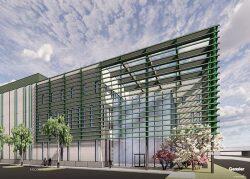Chicago’s data center developers are running out of space. Industrial real estate’s meteoric rise during the pandemic is a big reason why.
While progress is being made on Prime Data Center’s $1 billion project in suburban Elk Grove Village, and another proposal for a $2.5 billion data center is being eyed in nearby Mount Prospect on the former United Airlines campus, the industry is facing new headwinds.
Tech has been seen as an answer since Google leased offices in Fulton Market in 2015.The difficulty is being driven in part by record leasing activity in the past six months, draining Chicago’s supply. The lack of space for data centers is an obstacle for Chicago landlords who are trying to attract more tech tenants as office vacancy rates hover near records.
“We went from having a glut of inventory to extremely tight,” said Andy Cvengros, who brokers deals for data center assets with JLL. “We’ve already topped our biggest year ever and it’s only April 1.”
The new projects won’t have space to offer tech companies until 2024 at the earliest and face buildouts that will take eight to 10 years to reach their full capacities of 150 and 250 megawatts, respectively, in Elk Grove Village and Mount Prospect. In the meantime, heightened competition for real estate with industrial developers trying to satisfy an insatiable demand for warehousing in the Chicago area and across the nation is pushing data center leasing prices up and adding hurdles for new development to overcome.
Getting around the shortage is possible by quickly assembling land and working with local governments friendly to data centers like Elk Grove Village. The town acquired about 17 acres, including a former hotel site at 1600 Oakton Street that was previously eyed by local officials for new lodging, and sold it to Prime Data Centers for $21.3 million in a sale finalized early this year. Prime is in talks to close on seven more acres in another deal with the village for between $9.5 million and $11 million in the coming months, said Prime’s Chris Sumter.
“If you’re looking in the Chicago metro area, it has gotten very difficult to find 15, 20, 30-acre parcels especially in these urban infill areas,” he said. “The industrial guys have really come on strong, and are willing to pay anywhere from 10 to 20 percent higher per land foot basis than we normally would.”
More capacity is needed. About 90 megawatts of data center capacity has been leased already this year in the Chicago area, up from the roughly 70 megawatts leased last year, and in most years before the pandemic just 40 to 50 megawatts were absorbed, Cvengros said.
“Three months ago there was roughly 60 megawatts of available turnkey capacity in the Chicagoland area amongst 10 data center providers. You probably have four megawatts now,” said David Horowitz of T5 Data Centers, which also operates an asset in Elk Grove Village, a hotspot for data centers.
A new state policy could help ease the lack of supply. Midway through 2019, an Illinois state law took effect allowing data centers that invested at least $250 million and employ 20 people to be given sales tax exemptions on certain equipment purchases, and as of last year, the state had issued six agreements, including one for Horowitz’s T5 property, and two others in Elk Grove Village. The total exemption value for all six was more than $10 million.
“Take the entire picture and it’s a low-cost market for a customer,” Horowitz said. “That’s part of the reason why there is so much demand.”
Land grabs by industrial developers could still limit supply in the area, as data center developers generally need longer due diligence periods than industrial buyers to ensure large amounts of power can be delivered to the site.
Data centers also are less able to outbid industrial users than in the past since data leasing costs were sliding ahead of the pandemic, and industrial owners want to be paid a portion of what they would make in profits by building warehousing in order to sell to a data center developer.
“The traditional investor’s perception is that data center companies will pay a premium, but it’s not necessarily the case anymore,” Horowitz said.
Read more



